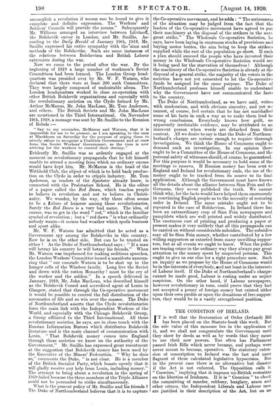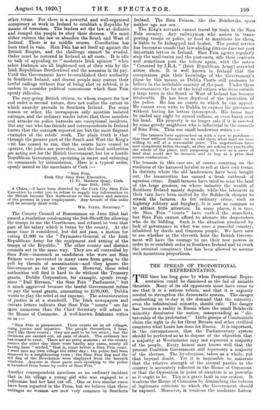THE CONDITION OF IRELAND.
F T is well that the Restoration of Order (Ireland) Bill 1 has been placed on the Statute-book this week. But the sole value of this measure lies in the application of it, and we shall not congratulate the Government until they show by deeds as well as by words that they mean to use their new powers. Too often. has Parliament passed Irish Bills which never became, and perhaps were never meant to become, operative. The statutory exten- sion. of conscription to Ireland was the last and most flagrant of these calculated legislative hypocrisies. But in the present case there is no alternative but disaster if the Act is not enforced. The Opposition calls it " Coercion," implying that it imposes un-Britiah restraints on the liberties of Irishmen. If it is " Coercion " to check the committing of murder, robbery, burglary, arson and other crimes, the Independent Liberals and Labour men are justified in their description of the Act, but on no other terms. For there is a powerful and well-organized conspiracy at work in Ireland to establish a Republic by means of terrorism. The leaders set the law at defiance and compel the people to obey their decrees. We must either enforce the law or abandon the South and West of Ireland. There is no middle course. Conciliation has been tried in vain. Sinn Fein has set itself up against the British Empire, and the challenge cannot be evaded. Order must be' restored in Ireland at all costs. It is idle to talk of appealing to " moderate Irish opinion " when sober Irishmen are all frightened out of their wits by the Irish Republican Brotherhood and the assassins in its pay. Until the Government have ie-established their authority in Southern Ireland, and decent people may pursue their lawful callings without fear of being shot or robbed, it is useless to consider political concessions which Sinn Fein openly ridicules.
The easy-going British citizen, to whom respect for law and order is second nature, does nob realize the extent to which anarchy prevails in Southern Ireland. For some reason or other, the newspapers only mention isolated outrages, and the ordinary reader infers that these murders and attacks on police barracks are exceptional incidents. But any one who has friends and correspondents in Ireland knows that the outrage reported are but the most flagrant examples of the rebels' work. The plain truth is that through the greater part of the South and West the King's writ has ceased to run, that the courts have ceased to operate, the police are powerless, and the local authorities ore acting not for the British Government, but for a hostile Republican Government, operating in secret and enforcing its commands by intimidation. Here is a typical order, openly issued to the merchants of Cork :— " Sinn Fein,
Cork City Sinn Fein Executive, 15 Fr. Mathew Quay, Cork. June 26th, 1920.
A Chara,—I have been directed by the Cork City Sinn Fein Executive to order you to refuse to supply any information to the British Income Tax Authorities re the names and salaries of the persons in your employment. Any breach of this order will be severely dealt with.
WM. IVERS, Secretary."
The County Council of Roscommon on June 22nd last passed a resolution condemning the Sub-Sheriff for allowing the troops to use the Courthouse, and refused to vote that part of his salary which is borne by the county. At the same time it considered, but did not pass, a motion for voting £1,000 to the " Paymaster-General of the Irish Republican Army for the equipment and arming of the troops of the Republic." The other county and district councils act in the same way. They are all controlled by Sinn Fein—inasmuch as candidates who were not Sinn Feiners were prevented in many cases from going to the poll by threats of assassination—and they ignore the Government as far as they can. However, these rebel authorities will find it hard to do without the Treasury grants. Dublin Corporation, for example, openly recog- nizes " Dail Eireann," the Sinn Fein " Parliament," but is much aggrieved because the lawful Government refuse to pay the usual grants, amounting to £170,000. Dublin wants to play the rebel at our expense. The administration of justice is at a standstill. The Irish newspapers and Private letters indicate that Sinn Fein " courts " are far more numerous than the Chief Secretary will admit in the House of Commons. A well-known Irishman writes to us :— " Sinn Fein is paramount. Their courts sit in all villages, doing justice and injustice. The people themselves, I hear, don't like these courts : they are said to be too strict ; but the decisions are carried out, on pain of death. The ordinary law has ceased to exist. There are no petty sessions ; at the county assizes the other day there were hardly any cases, nearly all having been " settled," that is, come before a Sinn Fein court. I went into my own village the other day ; the police had been removed to a neighbouring town ; the Sinn Fein flag and the red flag of the Revolution were displayed from the barrack windows. Anyone in these parts seen speaking to the police IS banished from home by order of Sinn Fein."
Another correspondent mentions as an ordinary incident that in his village a young girl who was engaged to a policeman had her hair cut off. One or two similar cases have been reported in the Press, but we believe that these outrages on women are now very common in Southern Ireland. The Sinn Feiners, like the Bolsheviks, spare neither age nor sex. The King's servants cannot travel by train in the Sinn Fein country. Any railwayman who assists in trans- porting troops or police, or food or munitions for them, is liable to be kidnapped and beaten. The postal service has become so unsafe that law-abiding citizens dare not post important letters in Ireland. Sinn Fein agents regularly stop the mail-trains and the post-carts, rifle their contents and sometimes post the letters again, with the notice " Censored by I.R.A. " (Irish Republican Army) scrawled across them. It is well known in Ireland that the conspirators gain their knowledge of the Government's plans by this means, as Dublin Castle still professes to believe in the inviolable sanctity of the post. Under these circumstances the lot of the loyal citizen who lives outside a large town in the South or West of Ireland has become intolerable. He has been deprived of the protection of the police. He has no courts to which he can appeal. He cannot even write to Dublin to express his grievances without having his letters intercepted. His house may be raided any night by armed ruffians, or even burnt over his head. His property is no longer safe if it is coveted by some greedy neighbour who is influential in the councils of Sinn Fein. Thus one small landowner writes :— " The tenants have approached us with a view to -purchase— this time without threats—so we told them what land we were willing to sell at a reasonable price. The negotiations have now completely fallen through, as they are asking for practically the whole of the place, only proposing to leave us a piece of land that could not be farmed, and to buy at a price that means confiscation."
The tenants in this case are, of course, counting on the readiness of the harassed loyalist to sell at their own terms. In districts where the old landowners have been bought out, the insurrection has caused a fresh outbreak of agrarian crime. Small farmers have tried to seize the land of the large graziers, on whose industry the wealth of Southern Ireland mainly depends, while the labourers in their turn have been incited by the Bolshevik element to attack the farmers. As for ordinary crime, such as highway robbery and burglary,. it is now so common as to attract little attention. In some places, it is true, the Sinn 'Fein " courts " have curbed the anarchists, but Sinn Fein cannot afford to alienate the desperadoes who do its bidding. Such is the situation produced by lack of governance in what was once a peaceful country, inhabited by docile and timorous people. We have now to see whether at the eleventh hour the British Govern- ment will have the courage to use their new powers in order to re-establish order in Southern Ireland and to crush the criminal conspiracy that has been allowed to assume such monstrous proportions.



































 Previous page
Previous page